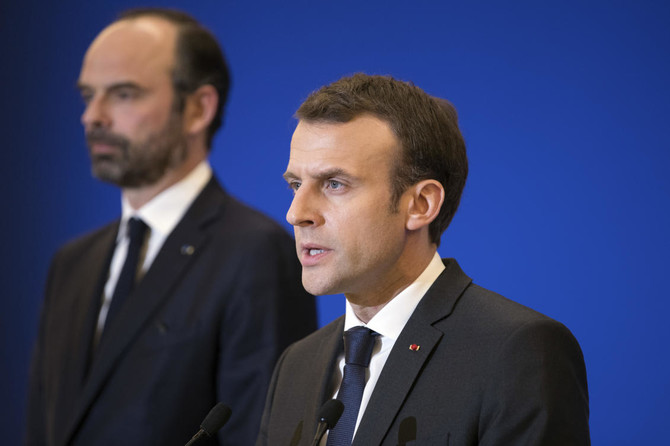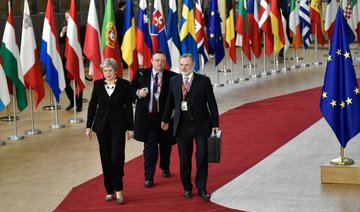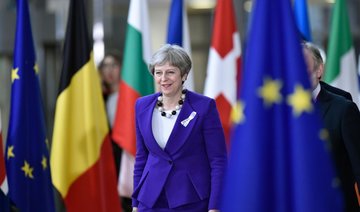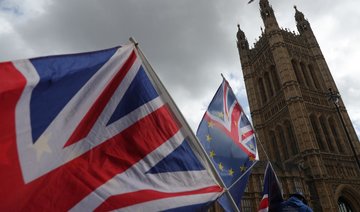BRUSSELS: European countries are set to take further steps as early as Monday to punish Russia over the poisoning of a former spy in England, officials said, as diplomatic pressure builds on Moscow over the nerve agent attack.
Russia, for its part, accused London of trying to force its European allies to take “confrontational steps” and unleashing an “anti-Russian campaign.”
EU leaders meeting in Brussels have agreed to recall the bloc’s ambassador from Moscow over the attack on Sergei Skripal and his daughter Yulia in the English city of Salisbury.
French President Emmanuel Macron said Friday the poisoning with the Soviet-made “Novichok” agent was an “attack on European sovereignty,” after EU leaders unanimously backed London’s assessment that it was “highly likely” Moscow was to blame and that there was no plausible alternative explanation.
A number of member states are considering following Britain’s lead and expelling Russian intelligence agents posing as diplomats, with German Chancellor Angela Merkel saying further coordinated actions were “necessary” to respond to the attack.
The 23 diplomats expelled by Moscow in a tit-for-tat move “have returned to the UK safely,” British Foreign Secretary Boris Johnson said on Twitter late Friday.
The question of whether to expel Russian diplomats will be left to individual member states and EU President Donald Tusk said action was expected as early as Monday.
But divisions remain over how far to go, with Austria already ruling out expelling diplomats, and Tusk, a former Polish prime minister, said it was not clear how many states would join the expulsions.
“More than one but I don’t think that it will be the whole group,” Tusk said.
Macron told a joint news conference with Merkel after the summit in Brussels that the March 4 incident — for which Russia denies responsibility — was “a serious challenge to our security and... an attack on European sovereignty.”
“It calls for a coordinated, determined response from the European Union and its member states,” the French leader said.
British Prime Minister Theresa May briefed other EU leaders on the probe into the attack over a summit dinner on Thursday.
She managed to overcome resistance from countries like Greece and Italy who were reluctant to put their close Kremlin ties in jeopardy to persuade them to back Britain’s conclusion that Moscow was to blame.
Merkel said May had shared “certain findings” which left little doubt Moscow was behind the first offensive use of a nerve agent in Europe since World War II.
“We believe that the analyzes are already very well-founded and this has not been questioned by anyone,” Merkel said.
“We agreed — Germany and France at least — that such reactions are still necessary in addition to recalling the ambassador.”
European Commission chief Jean-Claude Juncker said the recall of the ambassador was an “extraordinary measure” never before taken by the bloc.
The leaders of former Soviet bloc EU states the Czech Republic and Lithuania, as well as Denmark and Ireland, have said they were considering further unilateral steps, including expelling diplomats.
Latvia was the first to commit explicitly to expelling Russians, saying it expected to make an official announcement on Monday.
Moscow denounced the moves by Britain and the EU.
“As for the decision taken, we regret in this context that again such decisions are taken using the wording ‘highly likely’,” President Vladimir Putin’s spokesman Dmitry Peskov said Friday.
“We don’t agree with this and we repeat again that Russia absolutely definitely has nothing to do with the Skripal case.”
Foreign Minister Sergei Lavrov, on a visit to Hanoi, separately accused Britain of “feverishly trying to force allies to take confrontational steps,” suggesting London’s focus was now on making “the crisis with Russia as deep as possible.”
The Russian ambassador to Britain wrote Friday to a policeman exposed to the nerve agent used against the Skripals, insisting on Moscow’s innocence and thanking him for his bravery.
Alexander Yakovenko told Detective Sergeant Nick Bailey, who was released from hospital Thursday following two weeks of treatment, that he hoped the officer and the Skripals “get well soon.”
“I would like to express my sincere gratitude to you for your bravery when reacting to the assault on two Russian nationals,” he wrote.
Europe steps up pressure on Russia over spy attack
Europe steps up pressure on Russia over spy attack

Pope Francis, ramping up criticism of Israel, calls situation in Gaza ‘shameful’

- Pope Francis: ‘We cannot in any way accept the bombing of civilians’
- ‘We cannot accept that children are freezing to death because hospitals have been destroyed or a country’s energy network has been hit’
In a yearly address to diplomats delivered on his behalf by an aide, Francis appeared to reference deaths caused by winter cold in Gaza, where there is almost no electricity.
“We cannot in any way accept the bombing of civilians,” the text said.
“We cannot accept that children are freezing to death because hospitals have been destroyed or a country’s energy network has been hit.”
The pope was present for the address but asked an aide to read it for him as he is recovering from a cold.
Russia battles Kyiv drone strike blaze for second day

- Kyiv hit the depot in the city of Engels, some 500 kilometers from the two countries’ border
- Hours after the drone strike, Russia bombed the Ukrainian city of Zaporizhzhia
MOSCOW: Russian firefighters on Thursday battled for a second day to put out a blaze caused by a Ukrainian drone strike on an oil depot.
Kyiv hit the depot in the city of Engels, some 500 kilometers from the two countries’ border, in Russia’s southern Saratov region on Wednesday.
Moscow has said that two fire firefighters died trying to extinguish the blaze.
Hours after the drone strike, Russia bombed the Ukrainian city of Zaporizhzhia, killing at least 13 people and wounding more than 100.
“Emergency services are continuing to put out the consequences of the drone attack,” Saratov governor Roman Busargin said on Telegram.
“Specialists say that it will take some time to complete the burnout process,” he added.
Busargin said there was “no threat” to residential buildings.
Russia declared an emergency situation in Engels on Wednesday.
Images on social media showed a giant plume of smoke rising over the city, which has a population of around 220,000.
Ukraine has hit Russian infrastructure – sometimes deep behind the front lines – throughout Moscow’s offensive.
It has said that hitting the depot will cause “serious logistical problems” for Moscow’s air force.
Hours after the drone strike, Russia struck Zaporizhzhia, a southern Ukrainian city close to Moscow-occupied territory, killing 13 people.
Kyiv on Thursday said that 113 people were also wounded in the Zaporizhzhia strike, in an updated toll.
Russian attacks on the southern Kherson region killed two people on Thursday, Ukrainian officials said.
Prosecutors said the attacks killed a 54-year-old man in the village of Beryslav – on the Dnipro river that marks the front line – and a 60-year-old woman in Nezlamne, west of the city of Kherson.
The conflict in Ukraine – nearing its three-year mark – has escalated in recent months, with both sides seeking to gain an advantage ahead of Donald Trump returning to the US presidency.
Taiwan demonstrates sea defenses against potential Chinese attack as tensions rise with Beijing

- Kuang Hua VI fast attack missile boats and Tuo Chiang-class corvettes showcased in waters near Taiwan’s largest port of Kaohsiung
- Kaohsiung is a major hub for international trade considered key to resupplying Chinese forces should they establish a beachhead on the island
The island’s navy highlighted its Kuang Hua VI fast attack missile boats and Tuo Chiang-class corvettes in waters near Taiwan’s largest port of Kaohsiung, a major hub for international trade considered key to resupplying Chinese forces should they establish a beachhead on the island.
The Kuang Hua VI boats, with a crew of 19, carry indigenously developed Hsiung Feng II anti-ship missiles and displayed their ability to take to the sea in an emergency to intercept enemy ships about to cross the 44-kilometer limit of Taiwan’s contiguous zone, within which governments are permitted to take defensive action.
China routinely sends ships and planes to challenge Taiwan’s willingness and ability to counter intruders, prompting Taiwan to scramble jets, activate missile systems and dispatch warships. Taiwan demanded on Wednesday that China end its ongoing military activity in nearby waters, which it said is undermining peace and stability in the Taiwan Strait and disrupting international shipping and trade.
Mountainous Taiwan’s strategy is to counter the much larger Chinese military with a relatively flexible defense that can prevent Chinese troops from crossing the strait. Landing sites are few on Taiwan’s west coast facing China, forcing Beijing to focus on the east coast.
Hsiao Shun-ming, captain of a Tuo Chiang-class corvette, said his ship’s relatively small size still allows it to “deliver a formidable competitive power” against larger Chinese ships. The Tuo Chiang has a catamaran design and boasts high speeds and considerable stealth ability.
Taiwan has in recent years reinvigorated its domestic defense industry, although it still relies heavily on US technology such as upgraded fighter jets, missiles, tanks and detection equipment. US law requires it to consider threats to the island as matters of “grave concern,” and American and allied forces are expected to be a major factor in any conflict.
Thursday’s exercise “demonstrates the effectiveness of asymmetric warfare, and Taiwan’s commitment to defense self-reliance,” said Chen Ming-feng, rear admiral and commander of the navy’s 192 Fleet specializing in mine detection. “We are always ready to respond quickly and can handle any kind of maritime situation.”
China’s authoritarian one-party Communist government has refused almost all communication with Taiwan’s pro-independence governments since 2016, and some in Washington and elsewhere say Beijing is growing closer to taking military action.
China considers Taiwan a part of its territory, to be brought under its control by force if necessary, while most Taiwanese favor their de facto independence and democratic status.
Taliban call India ‘significant regional partner’ after Dubai meeting

- Afghan foreign ministry says the two sides discussed enhanced trade through Chabahar Port in Iran
- No foreign government, including India, has officially recognized the Taliban administration in Kabul
KABUL: The Taliban’s foreign office said they saw India as a “significant regional and economic partner” after meeting with its most senior foreign ministry official, the highest level talks with Delhi since their takeover of Afghanistan in 2021.
India’s Foreign Secretary Vikram Misri met acting Taliban Foreign Minister Amir Khan Muttaqi in Dubai on Wednesday.
Afghanistan’s foreign ministry said in a statement that they had discussed expanding relations with Afghanistan and to boost trade through Chabahar Port in Iran, which India has been developing for goods to bypass the ports of Karachi and Gwadar in its rival Pakistan.
“In line with Afghanistan’s balanced and economy-focused foreign policy, the Islamic Emirate aims to strengthen political and economic ties with India as a significant regional and economic partner,” the statement from Afghanistan’s foreign ministry said late on Wednesday.
India’s foreign ministry said after the Dubai meeting that India was considering engaging in development projects in Afghanistan and looking to boost trade ties.
No foreign government, including India, officially recognizes the Taliban administration.
However, India is one of several countries with a small mission in Kabul to facilitate trade, aid and medical support and has sent humanitarian aid to Afghanistan under the Taliban.
Regional players including China and Russia have signalled they are willing to boost trade and investment in Afghanistan.
The Delhi meeting could ruffle Pakistan, which borders both countries and has fought three wars in the past against India.
Pakistan and Afghanistan also have a strained relationship, with Pakistan saying that several militant attacks that have occurred in its country have been launched from Afghan soil — a charge the Afghan Taliban denies.
Earlier this week India’s foreign office told journalists they condemned airstrikes conducted late last year by Pakistan on Afghan soil.
Tensions high in Mozambique as opposition leader due home from exile

- Opposition leader Venancio Mondlane announced last week that he would continue his demand for ‘electoral truth’ after the October vote
- The election dispute has unleashed waves of violence that have left around 300 people dead, including protesters killed in a police crackdown
MAPUTO: Security forces prevented people from reaching the airport in Mozambique’s capital on Thursday as the opposition leader Venancio Mondlane was due to arrive home from exile to push his claim that he won presidential elections.
At one of several barriers erected around the airport, security forces shot and wounded one of hundreds of mostly young people wanting to reach the airport to welcome Mondlane home, an AFP reporter at the scene said.
Mondlane announced last week that he would land at Maputo’s international airport at around 8:00 a.m. (0600 GMT) in a bid to continue his demand for “electoral truth” after the October vote.
He claims that the election was rigged in favor of the candidate of the ruling Frelimo party, Daniel Chapo, who is due to be sworn in on January 15.
The election dispute has unleashed waves of violence that have left around 300 people dead, including protesters killed in a police crackdown, according to a tally by a local rights group.
Authorities say police have also been killed and there has been looting and vandalism.
There are fears that the charismatic Mondlane could be arrested on his return, including on charges related to the weeks of protests by his supporters, many of them young Mozambicans desperate for change after 50 years under Frelimo.
Any government action against Mondlane could send Mozambique — still scarred by years of civil war — into a major crisis, analysts said.
“If the government arrests Venancio, there will be an international outcry and potentially very dangerous demonstrations,” said Eric Morier-Genoud, an African history professor at Queen’s University Belfast.
“If they don’t arrest him, he will occupy the center and Frelimo will be weakened just a few days before the inauguration of the deputies and the president.”
Mondlane’s return gives people hope, said Fatima Pinto, 20, who trained as a general medical technician.
“We young people are here fighting for our tomorrow,” she said, echoing a key complaint among the youth about not being able to find work that matches their qualifications.
Chapo, 48, takes over from President Filipe Nyusi, who bows out at the end of his two-term limit. Official results gave him 65 percent of the vote compared to 24 percent for Mondlane.
But observers said they noted irregularities.
Since he went into hiding after the October 19 assassination of his lawyer, Mondlane has rallied his supporters via social media live addresses that have been joined by thousands.
By returning, Mondlane will “reclaim the political initiative,” Morier-Genoud said, with the population “more militant than ever.”
The unrest has caused major losses to Mozambique’s economy, stopping cross-border trade. Shipping, mining and industry has also been affected while thousands of people are reported to have fled to neighboring countries.
Mondlane’s return “will either destabilize or resolve the current political crisis,” said Tendai Mbanje, analyst at the Johannesburg-based African Center for Governance.
With tensions running high, there are even fears he could be assassinated, as some of his supporters have been, Mbanje said.
“He is the current hope and future of the youths: if his life is at risk or tampered with, that will be a source of unending instability,” he said.
“On the other hand, if Frelimo would like to unite the country, it is time that they take his return as an opportunity for dialogue.”
Any attempt to harm Mondlane would unleash a “big demonstration with unpredictable consequences,” said Mozambican sociologist Joao Feijo.
“We are talking about a population that has already tasted disobedience and is not afraid of anything else,” he said.
Tailor Americo Bulule, 52, said he hoped that the security forces would allow people to go to the airport to welcome Venancio.
“There’s already been a lot of bloodshed so I’d like his arrival not to be a problem and the police to give the population access and we can go there to receive him without weapons and tear gas,” he said.
















